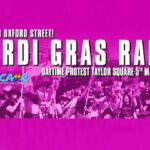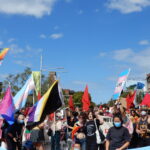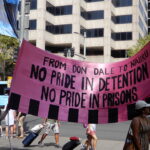NSW Police Has No Place at Mardi Gras, Says Pride in Protest’s Mikhael Burnard
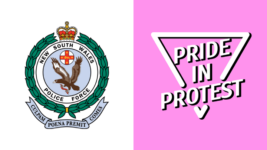
Pride in Protest is continuing to rally against the participation of the NSW Police Force in the Sydney Gay and Lesbian Mardi Gras, as the organisation’s annual general meeting draws closer. And this year, the controversy involves pre-parade decency checks conducted by NSW police.
As part of the 2014 Mardi Gras Police Accord, NSW police officers conduct decency checks of participants in the Mardi Gras parade prior to it taking place, with a representative of the organisation in tow.
And social justice LGBTIQ organisation Pride in Protest doesn’t consider that law enforcement should be permitted to hold this power over participants, as it points out that the practice officers are performing hearkens back to prejudicial policies of the past.
But the Mardi Gras board doesn’t agree. So, at this Saturday’s annual general meeting, a proposed Pride in Protest motion calling for the practice of pre-parade decency checks to be abolished, won’t be put to the vote.
Protesting prejudice
Established in 2018, Pride in Protest has been clear in its agenda since its beginning. The original 1978 Mardi Gras march was a protest calling for the rights of those of diverse sexualities and genders to be upheld and an end to their criminalisation.
Pride in Protest considers that this rights advocacy focus has been lost over the decades, and it needs to be revived because the injustices and prejudices that LGBTIQ communities were subjected to at the time of the event’s inception continue in various ways.
This was clearly on show during the 2013 Mardi Gras event, which saw blanket policing and multiple acts of violence on the part of police, including the assault on then 18-year-old Jamie Reed.
Indeed, the fallout from that event led to the establishment of the 2014 Mardi Gras Police Accord.
And despite a history of homophobic and transphobic behaviours within the NSW Police Force, which included beating on the participants of the original Mardi Gras protest march, today, uniformed police not only swarm the event but actively participate in it as well.
Shifting attitudes
Pride in Protest has four candidates running in the election for the Mardi Gras board this year. And the group is continuing to call for the NSW Police Force, the NSW Police Association and for the AFP to be prohibited from participating in the event.
And while Pride in Protest may have been something of a lone wolf when it began its calls for cops out of LGBTIQ events, this movement is growing, with recent years seeing a rising movement calling for Victoria police to be kept out of Melbourne’s Midsumma Pride events.
Sydney Criminal Lawyers spoke to Pride in Protest’s Mikhael Burnard, number two on the group’s Mardi Gras election ticket, about the history that decency checks come on the back of, the reasons why NSW police should be barred from events, and that attitudes in this regard are changing.
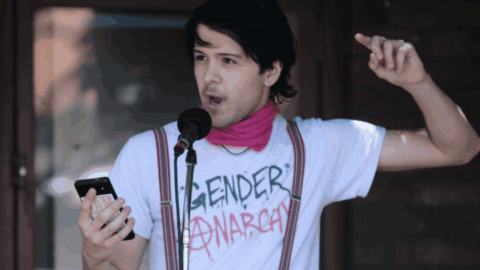
Pride in Protest has raised the issue of discontinuing NSW police decency checks at Mardi Gras. These checks involve a pre-parade perusal of those participating in the event by NSW police officers to ensure no one is being indecent in their understanding.
Mikhael, why are NSW police decency checks problematic as far as Pride in Protest is concerned?
There are a few reasons. One is that we consider it a form of sexual harassment because it is essentially the police passing judgement upon people’s bodies, which is open to abuse.
Another reason is that historically the concept of decency has been used to police queer and trans communities.
For example, laws against crossdressing, or laws regarding how people were allowed to present in terms of sex and gender were historically used to harass and bully queer and trans people.
That’s what the original Stonewall riots were about, I believe.
Given this history of the use of decency as a cudgel to bully the LGBT community, we think it’s not appropriate for police to be sanctioned and given free range to do this.
So, there’s a history to this practice?
There certainly is. Previously, there were laws on the books that related to what type of clothes people were allowed to wear in public.
These laws were particularly directed towards crossdressers. People were not allowed to wear articles of clothing associated with the opposite sex or gender, under the premise of decency.
It was indecent to be wearing those sorts of clothes.
So, this sanctioned space for the police to pass judgement on what is appropriate and what is inappropriate at Mardi Gras has a continuity with that.
Pride in Protest wanted to put this to the vote at this Saturday’s annual general meeting. Mardi Gras refused to do so.
What’s your organisation’s response to that decision? And further what’s your view on the relationship Mardi Gras has with NSW police?
Regarding the motion not being heard. It’s absurd. It’s antidemocratic.
From what we understand, the rationale for disallowing this motion from being heard is very much tied up with legal loopholes and the very specific wording of motions and the Mardi Gras Constitution.
It is worth pointing out that even though our motion, in terms of content and presentation, is more or less the same as motions that have been considered and heard previously, these loopholes were not employed in the same way.
It’s clearly a choice that is being made by the board of the Sydney Gay and Lesbian Mardi Gras, in order to exclude specific motions that they don’t like.
That’s antidemocratic. It’s against the spirit of consulting with the grassroots LGBT community, and it’s very clearly being done to secure the political agenda of the Mardi Gras board and its supporters.
In terms of the relationship between the Mardi Gras board and the police, we think it’s highly inappropriate.
Mardi Gras has an accord with the police, which is an agreement made with NSW police that makes a lot of concessions to them.
It allows them to have sniffer dogs and deploy personnel during Mardi Gras festivities. And they’re allowed to do these decency checks.
The accord was put into place after an event where the police assaulted at least one person during Mardi Gras, and in light of this attack by police on a young gay man, the board went on to roll over and permit the police to conduct all these extra measures.
It’s inappropriate. It’s conceding to the history of homophobic repression that has been within NSW police for its entire history and we think the accord should be torn up.
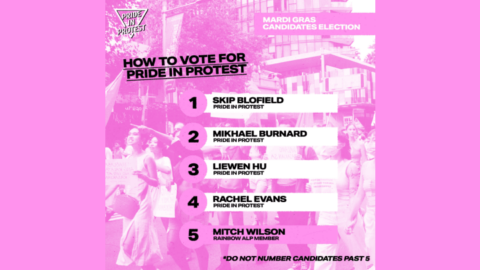
Pride in Protest has been campaigning for NSW police to be banned from partaking in the event more generally since 2018.
Can you talk about why you consider the police force should be barred?
First of all, there is a very tenuous history between the police and the LGBT queer and trans community.
Historically, the police has been a homophobic institution that reinforces systems of heteronormativity and cisnormativity, which repress queer and trans communities and their representation.
It’s worth pointing out that there are ongoing allegations of an extremely homophobic subculture within NSW police.
So, this is an institution that cannot even purge itself of homophobic and queerphobic elements and yet, somehow, they’re allowed to march in this sanctioned space.
We also believe that the police should be barred in solidarity with the Black Lives Matter movement.
We know that the intersection of Black and Indigenous identities with LGBT identities is especially dangerous. These are people who are at increased risk of police harassment.
For example, Veronica Baxter was an Indigenous transwoman who was arrested, placed in a men’s prison and died as a result of that. And there hasn’t been any accountability.
In light of this, we can’t allow the police to have this sanctioned space within what’s supposed to be our safe LGBT community.
Sydney’s hosting WorldPride next year. This has prompted Sydney lord mayor Clover Moore to announce that she doesn’t want visitors from across the planet to be subjected to “heavy-handed policing” at related events.
What would you say this tells us about the state of policing in this city?
This shows that it’s even obvious to people in power that NSW police have a history of homophobic and transphobic bullying.
More generally, you can see this at events like our recent Trans Day of Resistance rally or our Trans Day of Visibility rally.
These events are massively overpoliced. We’re talking about events where there are 100 to 150 rallygoers and there is something like 70 to 80 police. It is ridiculous.
The people attending these rallies are primarily younger people who are there to stand in mourning and solidarity with people that they’ve lost and to stand together against forces that are attacking them.
Then the police think it’s appropriate to treat them as a potential threat. This is absolutely unacceptable.
Also, literally, yesterday, we saw police attempting to arrest Danny Lim, the street performance artist, in the city.
This is a 78-year-old man who has never been a threat to anyone. He probably weighs negative five kilos. He was showing no belligerence or antagonism towards anyone.
But the police thought it appropriate to literally throw him to the ground and smash his head against the tiled floor.
That is completely unacceptable. It’s really indicative of the fact that police in Sydney and NSW are bullies.
They will arbitrarily exercise their powers in any way that they think they can get away with in order to reinforce their hold over people.
We think that’s unacceptable. And the fact that Clover Moore is in some small way acknowledging this is really telling.
This Saturday, Pride in Protest is running candidates for the Mardi Gras board at the election that is set to take place at the annual general meeting. What’s your ticket like?
In contrast to the more general Mardi Gras board candidates, we’re all working class people. We are all workers in the traditional sense. A lot of us are trade unionists and long-time activists.
In comparison, the typical cadre of Mardi Gras board candidates or members are corporate individuals from privileged, wealthy backgrounds. One of the board candidates this year is a senior executive of Woolworths.
So, if you have a board that is full of corporate members, they’re going to share the same interests, and treat Mardi Gras as a business rather than as a massive voice for LGBT advocacy.
Our lead candidate is Skip Blofield, who’s a nurse. He is a long-time member of the Nurses and Midwives Association, which is a trade union. And he’s the head of its Westmead branch.
Skip has been instrumental in organising industrial actions, pickets and strikes, and is a very passionate trans rights ally, an ally for racial justice and social justice.
The other candidates on the ticket, like myself, Rachel Evans and Liewen Hu, are all people that come from a background of grassroots activism, advocacy and social justice.
We believe Mardi Gras, as an organisation, should represent what we’re offering, as opposed to the corporate body that’s currently governing it.
And lastly, Mikhael, Pride in Protest has been campaigning on issues such as NSW police involvement in and corporate sponsorship of Mardi Gras for about half a decade now.
How has your campaigning impacted? Have attitudes been changing?
Attitudes have been changing towards issues regarding police involvement and those of corporatisation, and while Pride in Protest can’t take full credit for that, it has been part of this social shift.
There has been, especially since the Black Lives Matter campaign exploded in 2020, increased questioning of the institution of police and it has increased interest in grassroots activism and advocacy.
Pride in Protest is a body that represents those interests within Mardi Gras, the Mardi Gras board and the LGBT community.
There have just been some decisions elsewhere in the country involving police participation in Pride events, including with the Midsumma Festival, which has decided to disallow police involvement within that event.
That’s a positive step. And hopefully attitudes locally will evolve and when they do Pride in Protest members will steadfastly stand with the community, as we will in terms of the movement against corporatisation.




